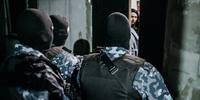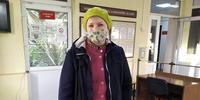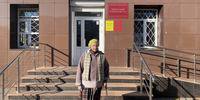The Case of Menchikova in Cherkessk
Filter
- #
In Cherkessk, the local FSB conducts 10 searches of Jehovah's Witnesses, including Elena Menchikova.
- #
Senior investigator of the investigation department of the FSB Directorate for the Karachay-Cherkess Republic, Captain of Justice R. N. Tazhikenov separates the materials of the criminal case of Elena Menchikova from the case of Albert Batchaev into a separate proceeding. The investigation sees illegal activity in the fact that the believer "sang songs" and "prayed to Jehovah God."
Investigator Tazhikenov transfers the case materials against the believer and "other persons who committed a crime under Part 2 of Article 282.2 of the Criminal Code of the Russian Federation" to the Investigative Directorate of the Investigative Committee. Among the materials of the case are postcards with the inscription "with love"; "We love you"; "Jehovah wants you to feel His love forever..."
- #
Elena Menchikova is being searched again, which lasts 3 hours. The investigator informs the believer that a criminal case has been opened against her. Elena's drawings are seized from her. The investigator does not give the believer a copy of the order and the protocol of the search.
- #
Senior Lieutenant V. A. Drakin, investigator of the investigation department of the FSB Directorate for the Karachay-Cherkess Republic, charges Yelena Menchikova with committing a crime under Part 2 of Article 282.2 of the Criminal Code of the Russian Federation.
- #
Investigator V. A. Drakin rejects Elena Menchikova's petition to terminate the criminal case, arguing that the believer explains her actions by quoting the Bible. According to the investigator, it is the use of biblical texts that confirms the criminal nature of Elena Menchikova's activities.
"Based on the content of the petition of the accused E.A. Menchikova, she asks to terminate the criminal case on the grounds provided for in paragraphs 1-2, part 1 of article 24 of the Code of Criminal Procedure of the Russian Federation. At the same time, describing her actions, she justifies them based on religious teachings and excerpts from the Holy Scriptures, which reveal the objective side of the unlawful act she committed, "the decision to refuse to dismiss the case says.
At the same time, an unlawful act, as follows from the documents of the criminal case, means that the believer discussed the Bible with the guests at home. The security forces consider this to be "active participation" in the legal entity liquidated by a court decision, although Yelena Menchikova has never been a member of it.
- #
Investigator V. A. Drakin expands the charge against Elena Menchikova. In addition to participating in an extremist organization, she is charged with involving a local woman in a banned organization (Part 1.1 of Article 282.2 of the Criminal Code of the Russian Federation). To this end, according to the investigation, at the beginning of 2018, the believer "developed a criminal plan," which consisted in conversations on biblical topics.
- #
Menchikova's case is submitted to the Cherkessk City Court of the Karachay-Cherkess Republic.
- #
The Circassian City Court of the Karachay-Cherkess Republic begins hearings on the merits. The case is being considered by Judge Din-Islam Chotchaev.
- #
Yelena Menchikova expresses her attitude to the charge: "Each faith has its own ways of expression: for some religions it is visiting temples, observing fasts, using the attributes of faith, and for the religion of Jehovah's Witnesses it is a joint discussion of the Bible with people, whether at home or on the street." The believer concludes: "I am convinced that the reason for my being in the dock is an incorrect interpretation of the decision of the Supreme Court of the Russian Federation, and not an alleged crime committed by me."
Four prosecution witnesses are being questioned, with whom the defendant is practically not personally acquainted. Three of them had previously been witnesses in the case of Albert Batchaev. No one provides clear answers to specific questions, for example, "under what circumstances did you meet the accused?", and witnesses cannot testify on the merits of the case.
- #
Another prosecution witness, Irina Khutova, is being questioned. She repeatedly says that she cannot remember the circumstances of her acquaintance with Elena. As a result, Khutova declares that she sees the defendant for the first time.
The prosecutor notes that there are inconsistencies between Khutova's testimony given during the preliminary investigation and at the current hearing.
- #
Prosecution witness Fyodor Sereda is being questioned. He refutes his earlier testimony against Elena Menchikova. When asked by the prosecutor about Elena's collection of funds, Fyodor replies that "no one walked around the hall with boxes, especially Menchikov."
Elena reminds the court of the clarifications of the Plenum of the Supreme Court of the Russian Federation of October 28, 2021, that the divine services of Jehovah's Witnesses, their joint rituals and ceremonies do not in themselves constitute a crime under Article 282.2 of the Criminal Code of the Russian Federation.
- #
During the debate, the prosecutor requests a sentence of 5 years in a penal colony for the believer.
Elena also speaks in the debate and with the last word.
The last word of the defendant Elena Menchikova in Cherkessk - #
Judge of the Circassian City Court of the Karachay-Cherkess Republic, Din-Islam Chotchaev, finds Menchikova guilty and sentences her to 5 years of probation with payment of all legal costs.
- #
The Supreme Court of the Karachay-Cherkess Republic releases Elena Menchikova from the obligation to pay court costs, but otherwise leaves the conviction unchanged.
- #
The Court of Cassation in Pyatigorsk cancels the verdict and the appellate ruling and sends the believer's case for a new trial in a different composition of the court.
- #
Elena Menchikova's case is submitted to the Cherkessk City Court of the Karachay-Cherkess Republic for a new trial. It will be conducted by judge Nauruz Shukurov.
- #
The court grants Elena Menchikova's request for the admission of the public defender and allows him to participate in this session.
Witnesses for the prosecution do not appear in court, so the prosecutor proposes to read out their written testimony given at the preliminary hearing. However, the defense insists on their personal presence.
The court examines the materials of the case.
- #
Fyodor Sereda and Irina Khutova, who had already testified at the first hearing of the case, are being interrogated. Sereda again refutes his testimony given during the preliminary investigation.
The third prosecution witness, answering the judge's questions, is confused and says that he does not remember anything.
- #
Two prosecution witnesses who attended Jehovah's Witnesses' services before 2013 are being questioned, which is not included in the period imputed to Menchikova. According to her, they have never been to the building where the services were held, and they cannot give its address. The defendant draws attention to the fact that the prosecution witnesses say "everything is written." The third witness is lost while answering the prosecutor's question if he knows anyone in the courtroom.
- #
The court begins to examine the material evidence seized from Menchikova during the search. Among them is a receipt for the purchase of a tablet, a drawing of a daughter 15 years ago. The defendant's conversation with Oncheva, who, on the instructions of the FSB, made a hidden audio recording, is also listened to.
- #
Videos of the Bible discussion are being viewed, as well as a conversation between the defendant and her daughter at her home. The video recordings have poor sound quality. This concludes the study of physical evidence.
- #
Elena Menchikova reads out her written notes. She says: "I have not denied and do not deny the fact that I have been a Christian, one of Jehovah's Witnesses for almost 30 years, but I have never had anything to do with extremism and its manifestations." She adds: "Before I became one of Jehovah's Witnesses, I was taught the Bible, not the statutes and regulations of a legal entity. Having understood the Bible better, I was baptized as one of Jehovah's Witnesses rather than as a member of the LRO. By baptism, I dedicated my life to God, not to serving or participating in a legal organization."
At the next meeting, the debate of the parties is scheduled.
- #
The prosecutor requests a imprisonment for 5 years in a penal colony with restriction of freedom for 1 year and 1 month for the believer.
Yelena Menchikova addresses the court with her final statement.
The Last Word at the Retrial of the Case of Defendant Elena Menchikova in Cherkessk - #




